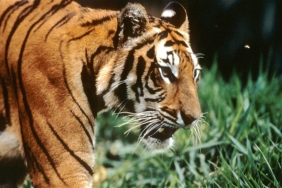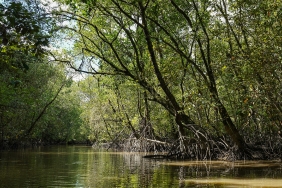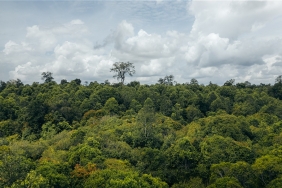HUMANS-ORANGUTANS: THE OFTEN IGNORED CONNECTION
By Jason Tulio
Jakarta (31/01)-Reminisce over seeing an elaborate stack of dominoes. Think back to the wonder and awe you felt as each domino clicked over time and again. Perhaps the clicking spilled off in different directions. Perhaps it even gave way to a pretty picture with each succeeding click. Do you recall what brought about the magic? It was a single finger, giving the gentlest of pushes that made all the difference. It’s a lesson in cause-and-effect that resonates in all of us.
If we are to learn something from this example, then it pays to apply these lessons to the world around us. Take for instance the orang-utan, the only great ape living outside of Africa. Currently endangered, their status is not unlike the easily toppled domino. There are two types of orang-utan living in Indonesia: the Bornean orang-utan (Pongo pygmaeus) and the Sumatran orang-utan (Pongo abelii). According to the IUCN Red List, the latter species has been classified as critically endangered. In short, the orang-utan is but a few clicks away of going the way of the dodo.
Far from a run-of-the-mill “save the animals” bid, the survival of the orang-utan affects humans in numerous ways. As a species, our relationship with these creatures is much closer than one would think. According to Chaerul Saleh, Flagship Species Coordinator for WWF Indonesia, humans and orang-utans share 97% of the same DNA. The relationship is also implied in its name: orang (person) and hutan (forest) loosely translates to “man of the forest”, Saleh added. In some ways, the extinction of these creatures is tantamount to human genocide. The cause lies in two main factors: habitat loss and poaching.
Saleh explains, “Habitat loss is due to conversion of natural forest into non-forest uses like plantations and logging, both legal and illegal, and also forest fires. Poaching is done to catch orang-utan babies for the market. When they try to get the babies, the must kill the mother first. The orang-utan baby sleeps on a canopy and it’s the only way to get it. So for every baby they kill at least one adult female.”But what are the effects? Each toppled orang-utan results in the toppling of something bigger; trees. Orang-utans operate as the chief distributor of seeds throughout the forest, a vital function in maintaining the balance and sustainability of the ecosystem.
It happens since orangutans consume an enormous amount of fruits whose seeds they subsequently disperse throughout the forest. Many of these fruits and other plants – which are also crucial components of the rainforest – depend on orangutans for the dispersal of their seeds. Because orangutans are such efficient dispersers of seeds, they are sometimes called “gardeners of the forest”.
As Saleh puts it frankly, “They are very important to the maintenance of their habitat. If the orang-utan is gone from the forest, then someday the forest will be gone as well. So you have to save the orang-utan in order to save the forest and yourself.”
It is a testament to the power we wield as humans when the survival of an entire species and its habitat rests solely on our shoulders. The close relationship we have with the orang-utan is crucial to our own survival and cannot be understated. The challenge lies in conveying this message to the greater public, as Saleh describes, “In terms of communication, we need to explain to people the concept of protecting the orang-utan and their natural habitats. Orang-utans living in the forest protect it, which is important not only for the people living in the forest but also for those that use its resources for things such as food and medicine - it all comes from the forest.”
In 1990, the Indonesian government established Law No. 5 of 1990; the conservation of living resources and their ecosystems. This law protects endangered species including the orang-utan, with a maximum punishment of five years imprisonment and a RP 100,000,000 fine.
For the average person, Saleh offers some simple tips, “The real solution will only come when there will be no demand for the products extracted unsustainably from the rainforests, palm oil, timber, and many more. Things people can do include reducing their use of paper to reduce the cutting of trees. Also, they can reduce their use of electricity. One more important thing is helping non-government organisations in their conservation efforts.”
Saleh’s words illustrate the big differences that the smallest of choices can make. Oftentimes, all it takes is the gentlest of pushes in one direction to see the world topple in rapid succession. With any luck, the conservation efforts will ensure the survival of the orang-utan, the forest and its resources.
Without it, the orang-utan, the forest and our very livelihood will amount to nothing more than a meagre reflection in our reminiscence – a rear-view mirror that shows destruction in its wake.





